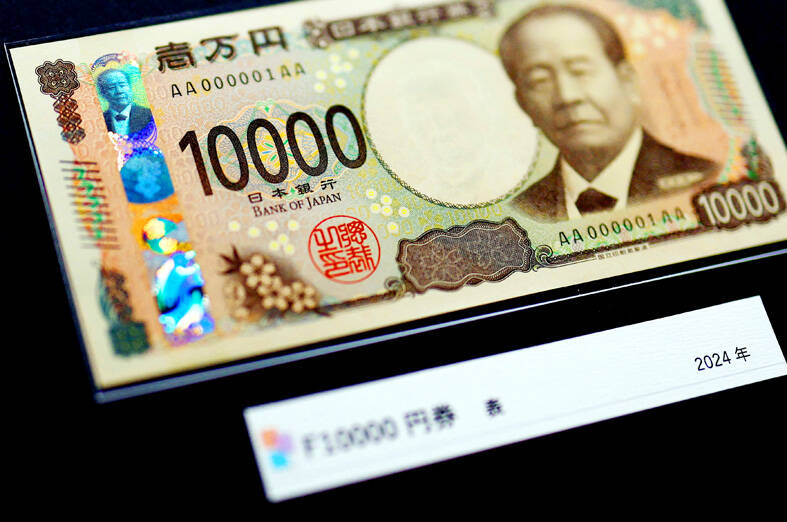Japan ramped up its warnings against currency speculation on Friday after the yen slid to a five-month low following a hint from the central bank chief that he might wait longer than expected before raising interest rates.
“The government’s deeply concerned about recent currency moves, including those driven by speculators,” Japanese Minister of Finance Katsunobu Kato said. “We will take appropriate action if there are excessive moves in the currency market.”
The yen regained some ground against the dollar after Kato’s remarks, strengthening to as much as ¥156.89 after earlier weakening to ¥157.93. The Japanese currency strengthened a little further after currency chief Atsushi Mimura also backed up Kato with similar comments in the afternoon.

Photo: Reuters
“We’re deeply concerned about recent foreign exchange moves,” Mimura told reporters. “For now I think it’s best not to say more beyond saying we’ll take appropriate responses against any excessive moves.”
The senior Japanese officials’ comments come as recent sharp movements in the yen feed into concerns that the Japanese government might intervene in the currency market to support its currency.
Authorities have stayed out of the market since July, when the yen hit ¥160 against the US dollar, partly driven by speculators capitalizing on the wide interest rate gap between Japan and the US. Tokyo has spent close to US$100 billion propping up the yen so far this year.
With the holiday season approaching, liquidity in the market is expected to decline, raising the possibility of more abrupt moves in the currency. Low liquidity also presents policymakers in Japan with a potential opportunity to have a relatively larger impact on the currency level if they do step into the market.
The yen experienced a sharp slide on Thursday following Bank of Japan (BOJ) Governor Kazuo Ueda’s comments hinting at the possibility of waiting longer before its next rate hike.
The central bank kept rates unchanged at the end of its meeting on Thursday, as expected by just over half of the economists surveyed by Bloomberg. Most respondents had projected the next rate hike to come by January.
Currency chief Mimura refrained from commenting on the BOJ’s recent communication, saying he should respect the central bank’s independence.
Overnight revisions to US GDP data and the US Federal Reserve’s preferred inflation gauges put further pressure on the yen, as it strengthened the market’s view that the Fed might slow its easing measures further. This followed a reduction in the number of the Fed’s expected rate cuts next year.
Separately, Japan’s key inflation gauge strengthened on the waning impact of government energy subsidies as the central bank continues to parse data before deciding on the timing of its next interest rate hike.
Consumer prices excluding fresh food rose 2.7 percent in November from a year earlier, driven by higher energy costs, the Ministry of Internal Affairs reported on Friday. That came in above a consensus estimate of 2.6 percent, and was higher than October’s 2.3 percent increase. An index excluding energy costs and fresh food prices advanced 2.4 percent, up from 2.3 percent.
Friday’s data support the view among economists that inflation continues to develop in line with the BOJ’s outlook, and the bank would likely keep reducing the degree of its monetary easing with gradual interest rate hikes.

Quanta Computer Inc (廣達) chairman Barry Lam (林百里) is expected to share his views about the artificial intelligence (AI) industry’s prospects during his speech at the company’s 37th anniversary ceremony, as AI servers have become a new growth engine for the equipment manufacturing service provider. Lam’s speech is much anticipated, as Quanta has risen as one of the world’s major AI server suppliers. The company reported a 30 percent year-on-year growth in consolidated revenue to NT$1.41 trillion (US$43.35 billion) last year, thanks to fast-growing demand for servers, especially those with AI capabilities. The company told investors in November last year that

Intel Corp has named Tasha Chuang (莊蓓瑜) to lead Intel Taiwan in a bid to reinforce relations between the company and its Taiwanese partners. The appointment of Chuang as general manager for Intel Taiwan takes effect on Thursday, the firm said in a statement yesterday. Chuang is to lead her team in Taiwan to pursue product development and sales growth in an effort to reinforce the company’s ties with its partners and clients, Intel said. Chuang was previously in charge of managing Intel’s ties with leading Taiwanese PC brand Asustek Computer Inc (華碩), which included helping Asustek strengthen its global businesses, the company

Taiwanese suppliers to Taiwan Semiconductor Manufacturing Co. (TSMC, 台積電) are expected to follow the contract chipmaker’s step to invest in the US, but their relocation may be seven to eight years away, Minister of Economic Affairs J.W. Kuo (郭智輝) said yesterday. When asked by opposition Chinese Nationalist Party (KMT) Legislator Niu Hsu-ting (牛煦庭) in the legislature about growing concerns that TSMC’s huge investments in the US will prompt its suppliers to follow suit, Kuo said based on the chipmaker’s current limited production volume, it is unlikely to lead its supply chain to go there for now. “Unless TSMC completes its planned six

TikTok abounds with viral videos accusing prestigious brands of secretly manufacturing luxury goods in China so they can be sold at cut prices. However, while these “revelations” are spurious, behind them lurks a well-oiled machine for selling counterfeit goods that is making the most of the confusion surrounding trade tariffs. Chinese content creators who portray themselves as workers or subcontractors in the luxury goods business claim that Beijing has lifted confidentiality clauses on local subcontractors as a way to respond to the huge hike in customs duties imposed on China by US President Donald Trump. They say this Chinese decision, of which Agence